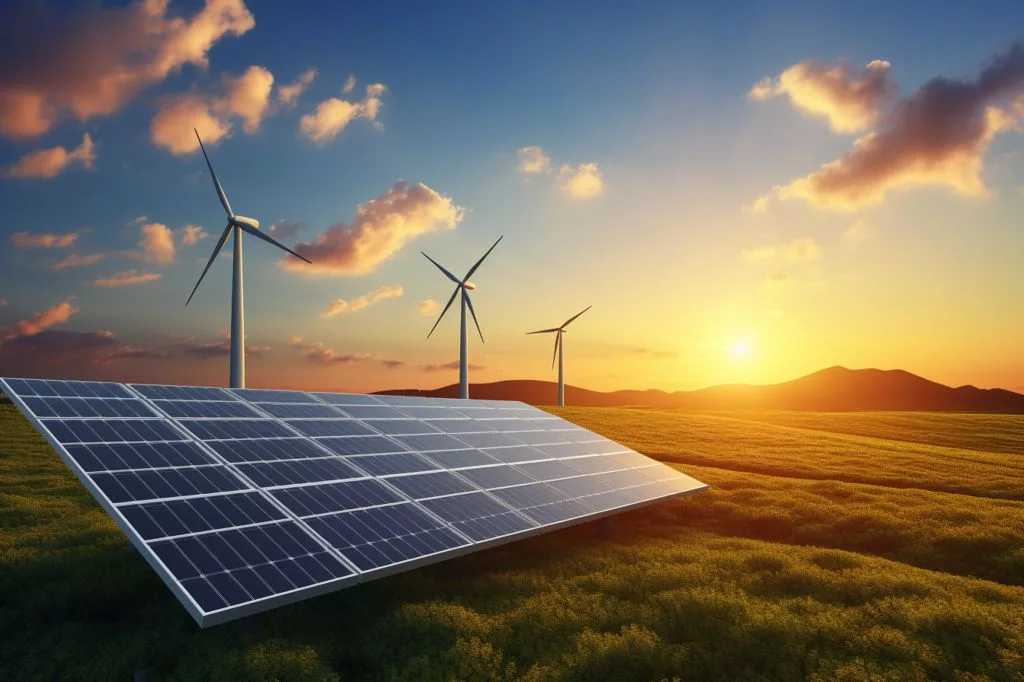Sure, here’s the emphasized sentence:
South Africa aims to become a major player in the green hydrogen sector, given its abundant renewable energy resources and strategic location. The country’s Investment Strategy recognizes the sector as critical for attracting foreign and domestic investment, and estimates suggest that it could contribute 3.6% of South Africa’s GDP by 2050 and generate approximately 370,000 jobs. President Cyril Ramaphosa has outlined the country’s ambitious plans for a green hydrogen economy, which include reducing domestic emissions by 10 to 15%. South Africa is also collaborating with other African countries through the African Green Hydrogen Alliance to tap into the continent’s potential for developing green hydrogen industries.
What are South Africa’s role and ambitions in the Green Hydrogen Revolution?
South Africa, with its plentiful renewable energy resources, is positioning itself as a major player in the emerging green hydrogen sector. The country’s Investment Strategy identifies green hydrogen as a critical sector for attracting both foreign and domestic direct investment, and the hydrogen economy could contribute 3.6% of South Africa’s GDP by 2050 and create approximately 370,000 jobs. South Africa has pledged to ambitious emission reduction targets, with green hydrogen having the potential to eliminate 10 to 15 percent of its domestic emissions.
South Africa’s Green Hydrogen Ambitions
The rise of the green hydrogen industry, driven by the global pursuit of renewable energy and sustainable development, offers vast opportunities for nations that aim to reduce their carbon emissions and ensure long-term energy security. South Africa, with its plentiful renewable energy resources and strategic geographical location, is positioning itself as a major player in this emerging sector.
During the second South African Green Hydrogen Summit, President Cyril Ramaphosa outlined the country’s bold plans for the green hydrogen economy. Central to these plans is the South African Investment Strategy, which identifies green hydrogen as a critical sector to attract both foreign and domestic direct investment.
The hydrogen economy is set to play a vital role in South Africa’s equitable energy transition, offering employment prospects, supporting vulnerable workers and communities, and empowering small enterprises. Estimates suggest that the hydrogen economy could contribute 3.6 percent to South Africa’s GDP by 2050 and create approximately 370,000 jobs.
Green Hydrogen’s Global Demand and South Africa’s Commitment
Sixty-four countries, responsible for 89 percent of global emissions, have set net-zero goals by 2050 in response to the worldwide climate crisis. Consequently, demand for green hydrogen is predicted to surge sevenfold by 2050. To limit global warming to below 1.5 degrees, green hydrogen must make up 10 to 20 percent of the world’s energy mix.
South Africa has pledged to ambitious emission reduction targets, with green hydrogen having the potential to eliminate 10 to 15 percent of its domestic emissions. This commitment to sustainable energy is reinforced by regional collaboration through the African Green Hydrogen Alliance, which comprises Egypt, Kenya, Mauritania, Morocco, Namibia, Ethiopia, Angola, and South Africa. The alliance seeks to tap into Africa’s potential for developing green hydrogen industries, collectively requesting technical assistance, funding, and market access from international public and private sector partners.
This year’s summit highlighted the technological progress and project maturity in the green hydrogen sector. Cooperation between public, private, and financial partners is crucial for unlocking Africa’s green hydrogen potential. Collaborative efforts can enable large-scale domestic and international demand for green hydrogen and enhance cooperation on green hydrogen production, storage, and distribution infrastructure.
South Africa’s Progress and Prospects in the Green Hydrogen Industry
In June 2023, South Africa signed a Heads of Agreement to establish the SA-H2 Fund, an innovative blended finance fund designed to promote the development of a green hydrogen sector and circular economy in South Africa. The fund aims to secure $1 billion in funding, raised directly in South Africa or through indirect channels, and is a partnership of private and public companies, both locally and internationally.
Recent developments in South Africa’s green hydrogen industry include a Joint Declaration of Intent with the German government, which focuses on market access, off-take opportunities, and value-added benefits in the production of green steel and green fertiliser. Furthermore, South Africa has signed a Memorandum of Understanding (MOU) with the Netherlands as an off-taker for green hydrogen derivative products.
A significant highlight of the summit was the signing of a Memorandum of Cooperation by three multinational corporations in the green hydrogen mobility sector: Sasol, Anglo American, and BMW. Sasol will supply green hydrogen to Anglo and BMW, supporting their efforts to transform commercial and passenger fleets. These initiatives are critical in the context of carbon border adjustment mechanisms.
South Africa’s robust capital markets and exceptional renewable energy resources, particularly solar and wind power, are primary drivers of green hydrogen production. However, financing green hydrogen projects will necessitate innovative funding structures from various stakeholders.
As South Africa and other African countries work to shape the green hydrogen landscape, it is crucial to establish proper planning, regulation, and incentive schemes to mobilize private sector investment. Through strategic partnerships, technological advancements, and ambitious policy decisions, South Africa is well on its path towards becoming a global leader in the green hydrogen revolution, securing a sustainable and prosperous future for its citizens and the African continent.
1. What is South Africa’s role and ambition in the Green Hydrogen Revolution?
South Africa aims to become a major player in the green hydrogen sector, given its abundant renewable energy resources and strategic location. The country’s Investment Strategy recognizes the sector as critical for attracting foreign and domestic investment, and estimates suggest that it could contribute 3.6% of South Africa’s GDP by 2050 and generate approximately 370,000 jobs.
2. What are the potential benefits of the Hydrogen economy for South Africa?
The hydrogen economy is set to play a vital role in South Africa’s equitable energy transition, offering employment prospects, supporting vulnerable workers and communities, and empowering small enterprises. Estimates suggest that the hydrogen economy could contribute 3.6 percent to South Africa’s GDP by 2050 and create approximately 370,000 jobs.
3. What are South Africa’s emission reduction targets and how can green hydrogen help achieve them?
South Africa has pledged to ambitious emission reduction targets, with green hydrogen having the potential to eliminate 10 to 15 percent of its domestic emissions. Green hydrogen can be a cleaner alternative to fossil fuels and help countries achieve their emission reduction targets.
4. How is South Africa collaborating with other African countries in the green hydrogen sector?
South Africa is collaborating with other African countries through the African Green Hydrogen Alliance to tap into the continent’s potential for developing green hydrogen industries, collectively requesting technical assistance, funding, and market access from international public and private sector partners.
5. What is the global demand for green hydrogen and its importance in limiting global warming?
Demand for green hydrogen is predicted to surge sevenfold by 2050. To limit global warming to below 1.5 degrees, green hydrogen must make up 10 to 20 percent of the world’s energy mix.
6. What is the SA-H2 Fund, and how will it promote the development of the green hydrogen sector in South Africa?
The SA-H2 Fund is an innovative blended finance fund designed to promote the development of a green hydrogen sector and circular economy in South Africa. The fund aims to secure $1 billion in funding, raised directly in South Africa or through indirect channels, and is a partnership of private and public companies, both locally and internationally.
7. What recent developments have occurred in South Africa’s green hydrogen industry?
Recent developments in South Africa’s green hydrogen industry include a Joint Declaration of Intent with the German government, which focuses on market access, off-take opportunities, and value-added benefits in the production of green steel and green fertiliser. Furthermore, South Africa has signed a Memorandum of Understanding (MOU) with the Netherlands as an off-taker for green hydrogen derivative products.
8. What is needed to mobilize private sector investment in the green hydrogen sector?
As South Africa and other African countries work to shape the green hydrogen landscape, it is crucial to establish proper planning, regulation, and incentive schemes to mobilize private sector investment. Through strategic partnerships, technological advancements, and ambitious policy decisions, South Africa is well on its path towards becoming a global leader in the green hydrogen revolution, securing a sustainable and prosperous future for its citizens and the African continent.








